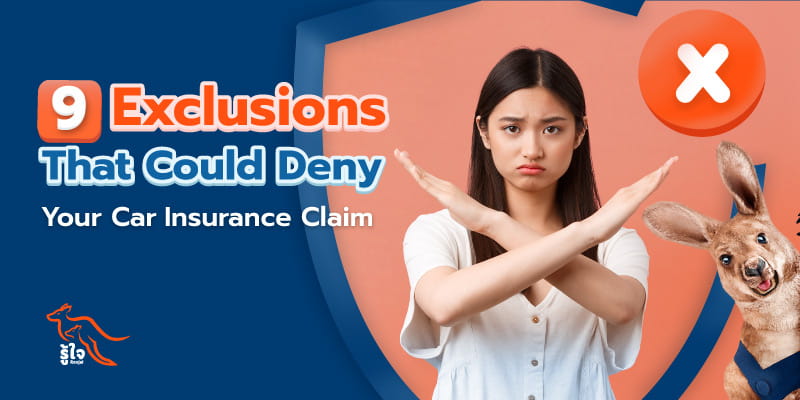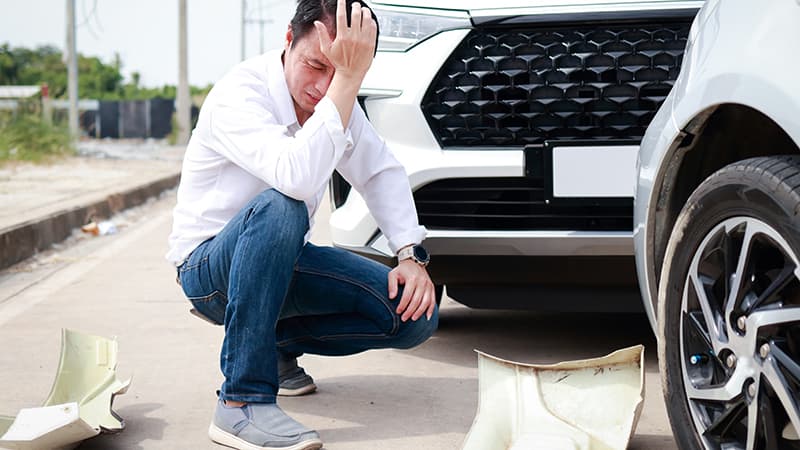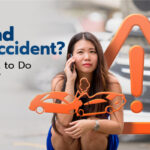
Navigating the complexities of car insurance can be challenging, especially when it comes to understanding why certain claims are rejected. While type 1 car insurance in Thailand is well-known for offering the most comprehensive coverage and higher limits compared to other types of insurance, there are important exceptions and conditions that many people might need to be made aware of.
Knowing these insurance exclusions and common reasons for claim rejections can help ensure that your type 1 car insurance claims are processed smoothly. In this article, we will explore some of the most common car insurance exclusions and frequent reasons why car insurance claims are denied, providing you with the knowledge to better protect yourself and your vehicle.
What does first-class insurance not cover?
Type 1 car insurance exclusions are clearly outlined in the policy, but they are often overlooked or misunderstood. This information is especially important for new drivers and first-time insurance buyers. Understanding these exclusions is essential for safer driving and making informed insurance decisions.
1. Not covered if driving outside the covered territory
If you drive outside the designated coverage area and get into an accident, your insurance will not cover the damages. For example, if your policy covers only Thailand, driving outside of this region means no coverage.
2. Not covered if using the car for racing
Using your insured car for racing or engaging in reckless driving can void your insurance coverage. Insurance policies typically do not cover accidents that occur during racing or other high-risk activities because they are considered intentional acts that increase the risk of damage.
3. Not covered if using the wrong type of vehicle
The insurance company may refuse to pay for the damages if you use a personal vehicle for commercial purposes, such as delivering goods or transporting passengers for a fee, and an accident occurs. This is because it violates the terms and conditions of a personal vehicle insurance policy.
4. Not covered if driving under the influence
Claims are often rejected if the driver was under the influence of alcohol or drugs at the time of the accident. Driving under the influence is a serious violation and most insurance policies explicitly exclude coverage for such incidents.
If the blood alcohol level is found to exceed the specified level, it is considered drunk driving and is illegal.
- For drivers under 20 years old, or those with a temporary licence (less than 2 years old), no licence, or a suspended/revoked licence, the alcohol level must not exceed 20 milligrams per cent.
- For drivers over 20 years old with a lifetime or 5-year licence, the alcohol level must not exceed 50 milligrams per cent.
5. Not covered if you don’t have a valid driver’s licence
If the driver does not have a valid driver’s licence at the time of the accident, the insurance claim is likely to be rejected. Having a valid licence is a basic requirement for insurance coverage.

6. Not covered if the vehicle is damaged during towing
If your car breaks down and gets damaged while being towed to a repair shop, your insurance may not cover the damage unless you have purchased additional towing coverage. Even with comprehensive insurance, this specific scenario often requires extra coverage.
7. Not covered if the vehicle is damaged due to nuclear incidents
In the unlikely event that your car is damaged due to a nuclear incident, such as a nuclear plant accident or radioactive contamination, your insurance will not cover the damages. This exclusion applies even if you have the highest level of coverage.
8. Not covered if the vehicle is damaged due to war conditions
Any damage to your vehicle caused by war, political unrest, or military actions is not covered by car insurance. This includes direct or indirect damage from conflicts, such as bullet holes or bomb blasts. Additionally, while Type 1 insurance covers damage caused by fire, it excludes fires resulting from civil commotion. This means that if your vehicle is damaged by a fire during a riot, your insurance will not cover the repair costs.
9. Not covered if used for illegal activities
If your car is used for illegal activities, such as fleeing from a crime scene, and gets damaged, your insurance will not cover the damages. Using your vehicle for unlawful purposes voids your coverage, regardless of the insurance type.
What to do if your car insurance claim is denied
1. Review the denial letter
Carefully read the denial letter from your insurance company. It will outline the specific reasons why your claim was rejected. Understanding these reasons is crucial for determining your next steps.
2. Gather documentation
Collect all relevant documents, including your insurance policy, claim forms, accident reports, and any correspondence with the insurer. Having all the necessary paperwork will help you build a strong case if you decide to appeal the decision.
3. Contact your insurer
Reach out to your insurance company to discuss the denial. Sometimes, claims are rejected due to misunderstandings or missing information that can be easily resolved through communication.
4. File an appeal
If you believe your claim was wrongly denied, you can file an appeal. Write a formal complaint letter detailing why you believe the denial was incorrect and include any additional evidence or documentation that supports your case.
Understanding why car insurance claims are often rejected can save you from a lot of frustration. Make sure to read your policy carefully, stick to the terms, and drive responsibly. With this knowledge, you’ll be well-prepared to file a car insurance claim.
For comprehensive coverage that you can rely on, get your quotes for car insurance in 5 minutes with Roojai today. Get the peace of mind you deserve with a policy tailored to your needs. Be sure to follow us on Facebook and add us as a friend on LINE using our ID @roojai to keep up with news on insurance, cars, expat guides, and more.



